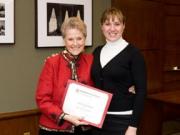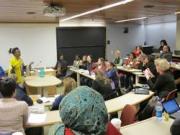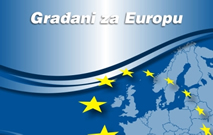Colloquium 2010: "Women Moderating Extremism"

Why Women Moderating Extremism?
Countering extremism is now one of the primary goals of the foreign policy of the United States and other NATO countries. While traditional counterintelligence strategies have worked in some contexts, in others they have been costly in lives lost, money spent, and damage to national reputations. Decision makers in the United States and its allied countries have rarely considered the particular contributions that women in leadership positions make to moderating extremist voices and activities. These two weeks of Inclusive Security consultations and events represent the first time that such a large number of women leaders have gathered to exchange success stories on this topic and advocate to decision makers in the United States.
Two Weeks of Learning and Advocacy
 A week of speaking, teaching, and public events in Cambridge included the Women and Security Executive Program and courses at Harvard’s Kennedy School of Government; a lunch discussion with Tad Oelstrom, director of Harvard’s National Security Program, and Cynthia Enloe, director of Clark University’s Women Studies Program; a lunch and discussion with Sanam Anderlini, author of Women Building Peace: What They Do, Why it Matters; a message management session with Harvard University’s National Security and Nieman Fellows; and the public event Women Moderating Extremism, featuring a speaker from each of the four conflict regions.
A week of speaking, teaching, and public events in Cambridge included the Women and Security Executive Program and courses at Harvard’s Kennedy School of Government; a lunch discussion with Tad Oelstrom, director of Harvard’s National Security Program, and Cynthia Enloe, director of Clark University’s Women Studies Program; a lunch and discussion with Sanam Anderlini, author of Women Building Peace: What They Do, Why it Matters; a message management session with Harvard University’s National Security and Nieman Fellows; and the public event Women Moderating Extremism, featuring a speaker from each of the four conflict regions.
Time in Washington, DC included sessions with Inclusive Security staff and outside experts on approaches to increasing women’s leadership in peacebuilding and drew on Inclusive Security’s training curriculum. Participants discussed relevant examples from their own work, identified common challenges and tactics, and drafted policy recommendations to increase the contributions of women in moderating extremism and building sustainable peace in their regions. Inclusive Security staff, along with other experts from US government and military, foreign governments, private security contractors, regional security organizations, and non-governmental organizations, helped to refine the recommendations.
Eighteen Advocacy Meetings
The visiting leaders then presented their final recommendations to decision makers over the course of 18 meetings in Washington. They met with Sen. Kirsten Gillibrand (D-NY) and Congresswoman Jan Schakowsky (D-IL); senior officials at the State Department (including Deputy Secretary of State for Management and Resources Jack Lew), and the U.S. Agency for International Development; and others. The women also met with assistants to Special Envoy to Afghanistan and Pakistan Richard Holbrooke.
Requests for increased U.S. cooperation ranged from new and regular meetings between U.S. intelligence services and women in conflict regions including Pakistan, to increased training of women leaders and university exchange programs with Lebanon. Other recommendations included expanded use of curricula promoting tolerance and peaceful coexistence in Rwanda and engaging women in public information campaigns to reduce the flow and use of small arms in Bosnia.
Coverage by US and International Media
 Media coverage featuring Colloquium participants included a special episode of a Dan Rather Reports television program recorded at The Newseum, Voice of America (Pakistani, Bosnian, and Rwandan delegations), Radio Sawa (Lebanese delegation), National Public Radio, the The Boston Globe (editorial), GlobalPost, and the Enough blog.
Media coverage featuring Colloquium participants included a special episode of a Dan Rather Reports television program recorded at The Newseum, Voice of America (Pakistani, Bosnian, and Rwandan delegations), Radio Sawa (Lebanese delegation), National Public Radio, the The Boston Globe (editorial), GlobalPost, and the Enough blog.



